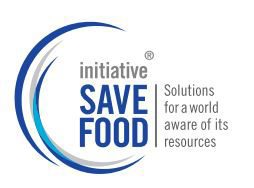GFCCC & UNEP Announce the Launch of their Cold Chain Database and Modelling Initiative
Category : Press Release
Arlington, VA – July 26th, 2021 – The Global Food Cold Chain Council (GFCCC) and the United Nations Environment Programme (UNEP) OzonAction announced the launch of their Cold Chain Database and Modeling initiative. The initiative marks the first formal step to assist developing countries in identifying their cold chain baseline in order to support the expansion of a sustainable cold chain and thereby help to reduce food loss and waste. The launch comes in advance of the United Nations Food Systems Summit, and is key to the framework proposed by GFCCC for supporting the expansion of a sustainable cold chain on a global basis.
According to the United Nations Food and Agriculture Organization (FAO), between 30 and 40 percent of food grown annually is lost or wasted. In a follow-on study last year conducted by the International Institute of Refrigeration (IIR), it was projected that more effective cold chain utilization could reduce this loss rate by approximately one third. With support provided by the Montreal Protocol’s Multilateral Fund, the Cold Chain Database and Modeling initiative is currently being piloted in six countries – Bahrain, Bosnia and Herzegovina, Maldives, North Macedonia, Paraguay, and Senegal. From these pilot data gathering initiatives, a model is being developed that will allow the projection of benefits of cold chain expansion.
“The analyses generated by this tool will help countries build their national policy and action framework for more efficient cold chain utilization and increased food security, which is necessary if we are to achieve the Zero Hunger objective embodied in UN Sustainable Development Goal 2. At the same time, the Cold Chain Database will help advance environmental protection by identifying opportunities for lower global warming potential refrigerants and more energy efficient equipment, which will help reduce both direct and indirect greenhouse gas emissions” said James Curlin, Head of UNEP OzonAction. “It is important that the UN, industry, governments, and NGOs collectively help developing countries build sustainable food cold chains to reap these multiple societal benefits.”
The database and modeling effort is the first phase of the GFCCC framework agenda to identify and highlight the benefits of cold chain expansion, the development of a technology matrix to achieve these benefits, GFCCC program focused initially on capacity building in national governments, and ultimately the development of sustainable cold chain expansion projects. “The framework we are proposing will allow countries to expand their cold chain sustainably, thereby increasing food security, expanding economic opportunity, and realizing significant environmental benefits,” said GFCCC Executive Director Kevin Fay. “It is a road map that the international community can embrace.”
The Cold Chain Database concept, methodology and data collection questionnaires are offered to interested countries and partners to help in assessing local cold chain capacities and designing respective action plans and policies. For more details, please visit the following link:
http://www.foodcoldchain.org/resources/cold-chain-initiative/
UNEP, through its OzonAction Branch at Law Division, has been strengthening the capacity of governments – particularly the operational focal points for the Montreal Protocol, known as National Ozone Units (NOUs) – and industry in developing countries to elaborate and enforce the policies required to implement the Protocol and to make informed decisions about alternative technologies. Its overall goal is to enable those countries to meet and sustain their compliance obligations under the treaty.
GFCCC is an independent not-for-profit industry organization that seeks to simultaneously reduce food waste, and related greenhouse gas emissions in the processing, transportation, storage, and retail display of cold food by expanding and improving access to energy efficient low-global warming potential technology.

